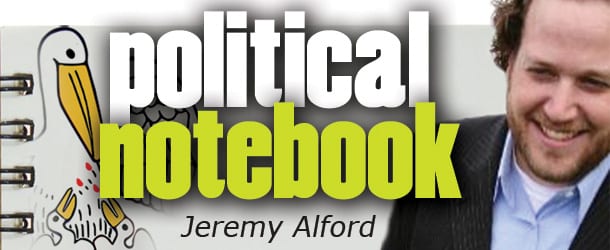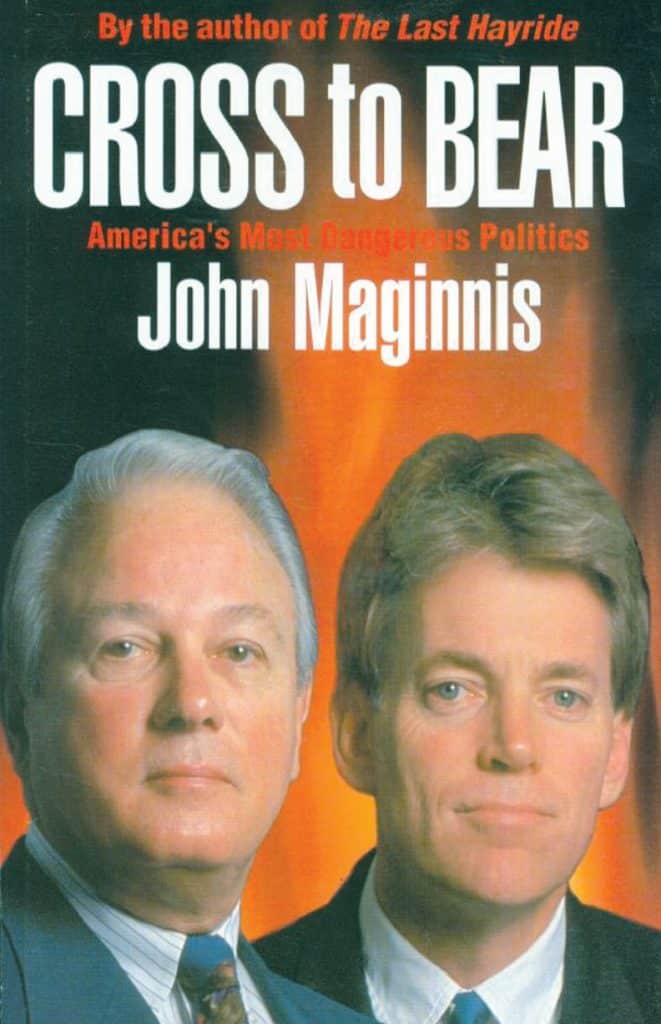By Jeremy Alford and Mitch Rabalais
If you’re from Louisiana and you have a federal issue regarding water — whether it be the water you drink, the water that stinks, the water that flooded your living room or the water that’s eating Louisiana alive — then you need to slate a visit with third-term Congressman Garret Graves.
Graves engineered many of Louisiana’s modern coastal restoration and protection laws, and, as a staffer, had a hand in gradating federal recovery policy that was geared specifically to the state.
“Stepping in and finding opportunities to use technology and take lessons learned, both good and bad, from experiences we have had are absolutely niche areas where we are spending a lot of time,” Graves told LaPolitics.
The House passed the CASES Act recently, a bill Graves co-sponsored with Democratic Congressman Joe Kennedy III of Massachusetts. The measure allows congressional offices to handle constituent casework with electronic approval, rather than requiring written authorization. For Graves, the bill was a logical solution to a frustrating problem that came to his attention during floods.
“We had people who were on the phone calling us in four feet of water and we had to tell them to go to their computers and print out a piece of paper,” Graves told LaPolitics. “You can imagine the feedback we were getting.”
Citing experiences with the Shelter-at-Home program, Graves also filed disaster relief legislation to make long-term disaster recovery funding “predictable and available within weeks of a disaster,” rather than months or years. “This bill starts to fix the slow, unnecessary federal processes that often re-victimize people and jeopardize recovery for entire communities.”
He added, “Bottom line is that we need to get recovery funds into the hands of disaster victims as soon as possible. Spending hundreds of millions on temporary housing while waiting on long-term funding is a waste of taxpayer dollars and delays recovery of our communities. The current system is a proven failure.”
Graves’ casework bill, after passing the House, is now pending action before the Senate Homeland Security and Government Committee. His disaster recovery bill is awaiting its first hearing before the House Transportation and Infrastructure Committee, on which Graves serves.
Political History: Huey Long’s Distaste For Mardi Gras
Huey P. Long made changes to many of the Bayou State’s cherished traditions during his reign over Louisiana. After all, the Kingfish was the one who tore down the Governor’s Mansion and rewrote the LSU fight song because the previous version did not suit his tastes.
While Long’s fingerprints can be found all over the state even today, the exclusive world of Mardi Gras in New Orleans was one area where his efforts to impose change were unsuccessful. For years, the legend was that the Kingfish had even wanted to abolish the Mardi Gras holiday entirely. Talk about an abuse of power.
While there is no record of Long ever publicly pushing to eradicate Carnival, there is a story of petty insults and lack of invitations that stuck in the craw of Louisiana’s most infamous politician.
According to historian Richard D. White in his book Kingfish, while there was no set tradition, governors prior to Long had been typically invited to the Crescent City’s Mardi Gras balls as honored guests. Then-Gov. John Parker had even ruled as King of Comus in 1924.
However, no krewes extended an invitation to Long to attend their festivities when he took office in 1928. Part of the reason was that the new governor had angered most of New Orleans’ movers and shakers in the campaign the previous fall, railing against the city to win over rural voters. To add insult to injury, Long’s House speaker, John Fournet, had only appointed two Crescent City lawmakers to the New Orleans City Affairs Committee and gave the other 13 seats to members from rural districts.
According to James Gill in Lords of Misrule, the Kingfish, who took his lack of invitations as a snub from the city, began attacking the New Orleans Carnival traditions. “He responded in public speeches by saying that the city leadership’s obsession with the frivolities of Mardi Gras were responsible for a decline in the fortunes of its maritime trade and had handed a golden opportunity to the go-getters of Houston,” Gill wrote.
While Long was ultimately unable to secure any invitations to balls or parades that year, he did venture down to the Roosevelt Hotel for Fat Tuesday, holding court in the lobby with a Ramos Gin Fizz in hand, still going on and on about how ridiculous the whole holiday was.
Cross To Bear Documentary
Strategic Partners & Media has entered into the interview phase of what could be a feature-length documentary on John Maginnis’ Cross to Bear, which recounts the unforgettable 1991 governor’s race between Edwin Edwards and former Klansman David Duke.
SPM partner John Loe started organizing his shooting schedule in January.
Loe and SPM, a Maryland-based media firm, also optioned Maginnis’ most iconic work, The Last Hayride, which chronicles Edwards’ 1983 campaign. Both books were published by Darkhorse Press, a sister company to Louisiana Political Review, which publishes LaPolitics.com.
In a November, 2017, interview, Jackie Drinkwater Maginnis, the widow of LaPolitics’ founder, said the firm had an option of two years on both books. “Reading between the lines, I think they perceived both books as still being relevant today,” Maginnis said of the media firm. “But I sensed a keen interest in Cross To Bear because of the political situation right now.”
Other terms of the deal have not been publicly disclosed.
Centralized Collections A Small Biz Priority
The Louisiana chapter of the National Federation of Independent Business is lining up behind a constitutional amendment that would — over time, and without definitive directives — create a centralized sales tax collection system in the Bayou State.
While some details of the plan remain murky, the amendment’s purpose is clear. Rather than retailers and other businesses paying local sales taxes in each individual parish, there would be a one-stop shop on the state level.
The temporary increase in the sales tax could very much be on the agenda in the upcoming regular session, and the push by small business for the consolidation of collections in Baton Rouge could become the defining policy issue heading into the fall election cycle.
NFIB state director Dawn Starns said the goal is to get the amendment, which is expected to be authored by Rep. Tanner Magee, on the October ballot. If passed, the amendment likely would be headed for implementation in January of 2021. “That would give the Legislature the chance to educate itself; local governments the opportunity to explore the issue; and lawmakers the [opportunity] to take their time creating statutory regulations,” she said.
Starns said there are no plans to create a statutory companion for the amendment at this hour. Instead, voters would get the first shot at eliminating one of only two dispersive state sales tax collection systems in the country.
“The online sales tax component was the impetus for this, so it’s fitting that the Legislature would create the guidelines,” Starns said. “The legislation is broad for a reason, and at this point we have got to move forward.”
The single collector system has long been opposed by local governments, chiefly because control would shift from their backyards to Baton Rouge.
“I understand where local officials are coming from, and they do a great job, so this shouldn’t be viewed as a punishment,” said Magee. “As we move forward, we have to be able to adjust to an internet-based economy, and we simply cannot have multiple collectors.”
Q&A With Andrew Bautsch
LaPolitics: We recently saw the state party file a request for documents related to Gov. John Bel Edwards’ business summit. Why did the LAGOP take this action, and what do you believe the documents will show?
Louisiana Republican Party Executive Director Andrew Bautsch: We believe the governor basically paid for a campaign pep rally with taxpayer dollars, and the documents we’ve requested should shed light on this matter.
LaPolitics: What are the biggest issues that the party is tracking heading into the regular session?
Bautsch: That’s a tough question because there are quite a few issues! The really important things that everyone should be focusing on are the state’s economy, business climate and whether we [were] better off [before] Gov. Edwards took office (over three years ago). The plain fact is that our state government is in desperate need of reform, and this governor is not reform-minded in the least.
LaPolitics: What legislative races will the party be closely following this fall?
Bautsch: We will be following all the races, but there are a number of races that we will contest with a plan to flip the seats to Republicans.
LaPolitics: I know you can’t reveal too much, but can you give us a preview of some new things we will see from the party closer to election season?
Bautsch: Well, I think everyone will be surprised by the breadth and extent of what the LAGOP is doing. We are rebuilding our grassroots infrastructure throughout the state by working with our activists, parish executive committees and elected officials. We are helping to recruit new candidates while working in conjunction with other Republican and conservative organizations to train and support our candidates, elected officials and campaigns to get out the vote.
For more Louisiana political news, visit LaPolitics.com or follow Alford and Rabalais on Twitter via @LaPoliticsNow.















Comments are closed.